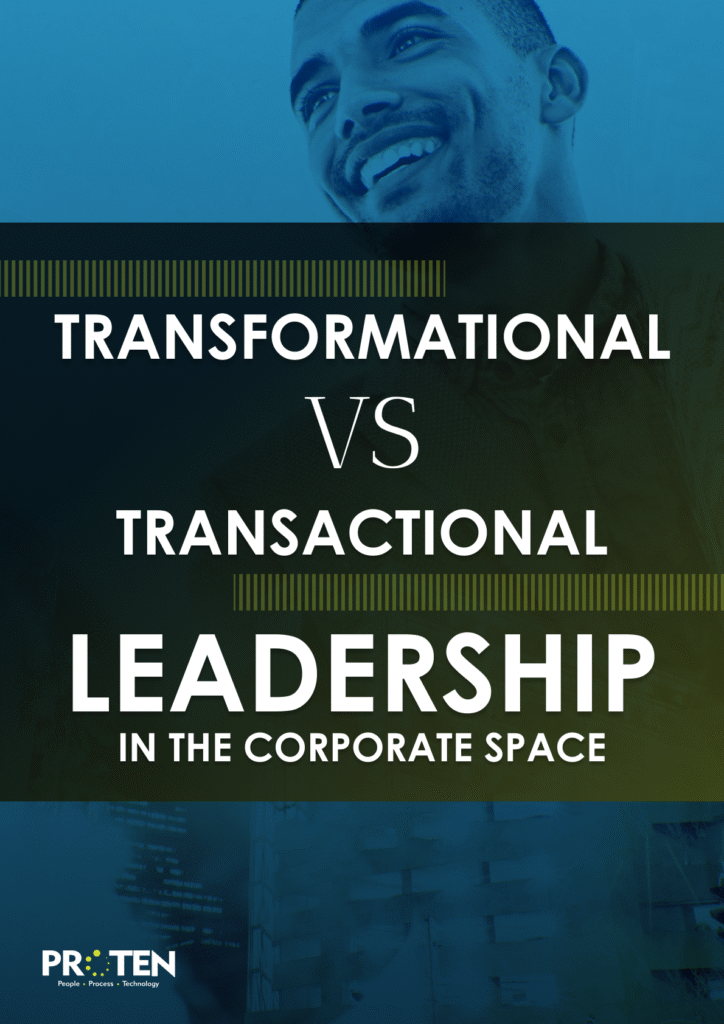Leadership has long been recognised as the compass that determines whether an organisation thrives, stagnates, or collapses. In corporate settings, leadership does not merely set direction; it establishes culture, inspires behaviours, and directly influences the bottom line. For Nigerian organisations operating in a dynamic and often volatile socio-economic environment, leadership is not optional—it is decisive. Among the many leadership theories studied globally, two that often spark debate are transformational and transactional leadership. While both have their merits and shortcomings, their practical applications within the corporate space deserve careful analysis.

Source: ResearchGate
This report conducts a scenario-based analysis of transformational and transactional leadership, highlighting how each manifests in practice, their relative strengths and weaknesses, and their overall suitability for Nigeria’s corporate realities. Ultimately, the report argues that transformational leadership, while complemented by transactional tools, offers the more sustainable path to corporate success in Nigeria.
Understanding Transformational Leadership
Transformational leadership is a model whereby leaders inspire and motivate employees to exceed expectations by creating a shared vision, fostering innovation, and encouraging personal growth. First introduced by James MacGregor Burns (1978) and expanded by Bernard Bass (1990), transformational leadership goes beyond transactional exchanges of reward and punishment. Instead, it builds emotional connections, empowers individuals, and transforms organisations by focusing on long-term goals rather than immediate outputs.

Source: LeadershipIQ
Key attributes of transformational leaders include:
- Idealised Influence: Leaders serve as role models and embody organisational values.
- Inspirational Motivation: They articulate a compelling vision that motivates employees.
- Intellectual Stimulation: They encourage creativity, innovation, and problem-solving.
- Individualised Consideration: They pay attention to employees’ personal and professional needs.
Transformational leadership thrives in contexts where adaptability, creativity, and engagement are critical to success.
Understanding Transactional Leadership
Transactional leadership, by contrast, is based on structured tasks, clear goals, and reward-punishment mechanisms. Rooted in management theory, it emphasises order, efficiency, and performance monitoring. Leaders adopting this style maintain authority, ensure compliance, and drive productivity by providing incentives for performance or imposing sanctions for underperformance.
Core elements of transactional leadership include:
- Contingent Reward: Employees are rewarded when they achieve specific targets.
- Management by Exception: Leaders intervene only when performance falls short of standards.
- Directive Structures: Clearly defined roles and responsibilities minimise ambiguity.
While transactional leadership may appear rigid, it is effective in high-risk industries, compliance-driven sectors, or operational roles requiring strict adherence to processes.
Scenario 1: Transformational Leadership in a Technology Firm
Consider a mid-sized technology start-up aspiring to dominate the mobile payments market. The CEO adopts a transformational approach. At company meetings, she articulates a vision of financial inclusion for every Nigerian, particularly those in underserved rural communities. She invests in training sessions that not only build technical expertise but also instil a sense of mission. She encourages cross-functional collaboration, celebrating innovative ideas even when they fail.
This leadership style yields notable outcomes:
- Staff morale rises as employees feel connected to a higher purpose.
- Turnover declines because workers identify with the vision and perceive opportunities for personal growth.
- Teams innovate solutions to systemic challenges, such as unstable internet connections or limited smartphone penetration, positioning the company as an industry pioneer.
The transformational style fosters resilience, creativity, and long-term loyalty—assets vital in Nigeria’s highly competitive and unpredictable technology sector.
Scenario 2: Transactional Leadership in a Logistics Company
Now consider a logistics firm managing nationwide deliveries. The operations manager relies heavily on transactional leadership. Drivers and staff are rewarded for meeting strict delivery timelines and penalised for delays. Compliance with procedures is enforced, and productivity metrics dominate performance reviews.
In the short term, the company achieves higher operational efficiency. Deliveries are punctual, and employees understand exactly what is expected of them. However, cracks soon appear. When external disruptions such as fuel scarcity or regional insecurity occur, employees lack the autonomy or innovative thinking to adapt. Morale drops as workers view their roles as mechanical, and attrition rates rise. The company struggles to retain talent capable of problem-solving, and innovation stagnates.
While transactional leadership provides structure and clarity, its rigidity can sometimes prove inadequate in Nigeria’s uncertain and complex business landscape.
Nigerian Corporate Space: Which Style Fits Best?
The Nigerian corporate environment presents unique challenges: economic volatility, infrastructural bottlenecks, regulatory unpredictability, and a youthful workforce demanding meaningful engagement. Organisations must therefore strike a balance between structure and innovation.
Transactional leadership may provide immediate gains in compliance-heavy sectors such as oil and gas, manufacturing, or banking, where safety, efficiency, and regulatory adherence are paramount. However, as Nigeria’s economy increasingly embraces knowledge-based industries—technology, fintech, creative sectors, and services—transactional rigidity may limit organisational growth.

Source: ElectroIQ
Transformational leadership, on the other hand, aligns with Nigeria’s need for adaptive, resilient, and innovative organisations. By cultivating creativity and building trust, transformational leaders inspire employees to contribute meaningfully, creating sustainable competitive advantages. In contexts such as start-ups, digital enterprises, or forward-looking corporates, transformational leadership holds the key to long-term success.
The Hybrid Approach
It is important to note that the debate is not an absolute dichotomy. Successful organisations often blend both leadership styles, applying transactional tools where clarity and compliance are required, while embedding transformational qualities for inspiration and innovation. Organisations, therefore, should not dismiss transactional leadership outright but rather contextualise its use alongside a dominant transformational framework.
Conclusion
In Nigeria’s dynamic business environment, both transformational and transactional leadership have their place. Transactional leadership may serve operational needs, but transformational leadership is best positioned to drive long-term growth, resilience, and innovation. Organisations must embrace transformational qualities while selectively applying transactional tools to balance structure with adaptability.
Developing leaders who can embody this hybrid model requires deliberate investment. Proten International offers comprehensive leadership training programmes, Learning & Development solutions, and HR Advisory services designed to equip leaders with the skills to inspire teams, navigate complexity, and achieve sustainable results. By engaging with Proten International, organisations can future-proof their leadership pipelines and secure a competitive edge in Nigeria’s evolving corporate space. Send an email to info@protenintl.com today to get started.

